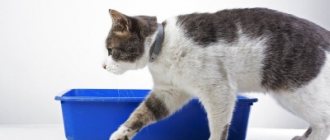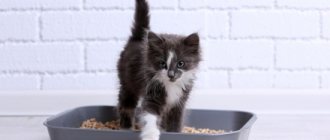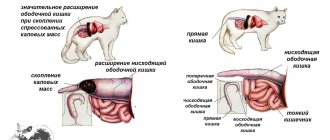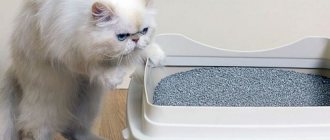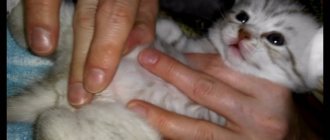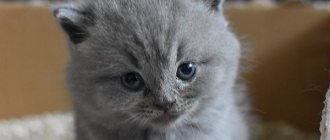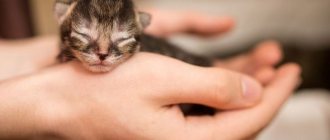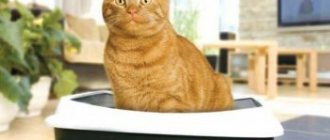20135Administration
1
How to train a pet to use a litter box? How often do kittens go to the toilet? Why do problems with stool and urination occur? Similar questions regarding proper care and maintenance most often worry owners and breeders of furry purrs.
more often than older dogs
Undoubtedly, a kitten needs care, attention, and proper care. At the same time, one of the important factors in the health of your beloved pet is the functioning of the digestive tract and genitourinary system. Let's consider how many times a day a small kitten should go to the toilet, what is the norm and what is a deviation.
Toilet for newborn kittens
In the first two to three weeks of life, the cat fully cares for its offspring and helps them go to the toilet. By licking newborn babies, a caring mother cleanses the fur from pathogenic microorganisms, foreign odors, dirt, and stimulates digestive processes. This “massage” allows you to get rid of foreign gases in the intestines, promotes natural emptying, and cleanses the body of harmful decay products. The cat licks all the secretions. A newborn kitten should go to the toilet 7-10 times a day .
Digestion is a complex physiological process aimed at releasing energy, which is necessary for normal well-being, vital activity, and the functioning of internal organs and systems. In the gastrointestinal tract of animals, complex compounds are converted into simple ones, accessible for absorption, which subsequently take part in metabolic processes - metabolism. The body is saturated with useful nutrients - vitamins, macro-microelements.
In the first month after the birth of kittens, the gastrointestinal tract is formed and colonized with beneficial microorganisms that produce the necessary digestive enzymes.
© shutterstock
Starting from three weeks, babies, in addition to mother's milk, can receive complementary foods: cottage cheese, natural yoghurts, low-fat boiled, chopped meat, special ready-made canned food marked “For small kittens.” With a properly selected diet, the process of defecation occurs independently, without any problems.
Important! Toxins, harmful components, undigested substances must be promptly removed from the body of animals during the act of defecation and urination. Otherwise, severe intoxication of the body may develop.
Unfortunately, inexperienced primiparous cats do not always properly care for their offspring in the first month and forget about their direct responsibilities for caring for the newborn offspring. The kittens' tummy, swollen from gases and feces, causes severe discomfort and provokes pain. Therefore, owners should not only very carefully monitor the condition of the mother cat, but also the little kittens.
If newborn kittens have a tight, enlarged tummy, the babies constantly meow, show restlessness, and cannot go to the toilet for more than five days, you can alleviate their condition with an ordinary soft-bristled brush, sterile gauze, or a bandage.
Using available means, gently massage the peritoneum of small pets five to eight times a day, irritating the animals’ groin area (anus, urinary canal).
How often should a three to four month old kitten go to the toilet?
If there are no congenital pathologies, kittens at the age of three to four months switch to a nutritious diet, which leads to a change in the nature and frequency of bowel movements. The excrement acquires a more formed shape, a constant, solid consistency.
How often does a kitten go to the toilet at 3-4 weeks of age? It all depends on what kind of nutrition the baby receives in the first month.
Fluffy pets aged three to four months should defecate three to six times a day. This applies to both the act of defecation and urination. During the hot period of the year, your pet may walk “smallly” more often (4-7 times a day) due to drinking more fluid. A fully grown five month old kitten should poop once a day.
Important! If a cat eats food rich in fiber but lower in protein, the number of bowel movements increases.
The constituent components of food and feed activate the production of enzymes in the intestines, normalizing the activity of beneficial flora. Intestinal motility increases, which promotes natural bowel movement.
© shutterstock
The frequency of visits to the tray depends on the quantity, quality, and consistency of the feed. Feces should have a solid consistency and not contain foreign impurities (foam, bloody inclusions, clots), or undigested pieces of food.
Preventing constipation in kittens
You need to avoid excess protein, select high-quality dry food, or prepare your own food so that it is balanced. The first weeks after the move, you should give the same food that the cat is accustomed to from the breeder. Babies fed on natural food should not be suddenly switched to dry food. Cats go to the toilet more often if they have enough fiber in their diet. The animal should always have access to clean water.
Active games with your pet will be beneficial. You don't want your cat to become too passive. To interest your pet, you should buy different toys.
Small objects should not reach the cat. If there is a child at home who scatters small beads and toys, you should clean up what is scattered after him. Objects can become lodged in the intestines, causing partial or complete blockages that sometimes result in the death of the pet.
It is recommended to regularly show the animal to a veterinarian. Examinations will help detect pathologies in the early stages and take timely measures.
All information posted on the site is provided in accordance with the User Agreement and is not a direct instruction to action. We strongly recommend that before using any product, you must obtain a face-to-face consultation at an accredited veterinary clinic.
Why do problems with stool occur?
When planning to have a furry pet, future owners must understand the responsibility they take on for the life and health of their beloved cat. It is very important to provide proper care, create optimal living conditions, and think through the diet. The period of adaptation and socialization should be favorable, without stress. Any negative factors can weaken the immunity of animals and provoke changes in behavior and the functioning of internal organs and systems.
If an older kitten has a normal appetite, eats well, but there is no bowel movement, the fluffy does not go to the toilet, this condition can be provoked by various factors.
Causes of constipation in small kittens:
- Stress. A change of place of residence, a trip to the veterinary clinic, the presence of other animals in the house, and other stressful situations can lead to the absence of defecation. The kitten may not poop or go to the toilet for two or three days.
- Early weaning from the cat. Missing his mother in his new home, the fluffy may experience problems with bowel movements for up to four to five days. This is normal, but if the situation does not change, seek help from a veterinarian.
- Unbalanced nutrition, sudden changes in diet, consumption of foods rich in protein. In the first weeks and months, try to give your pet the same food that he received from his previous owners. Introduce new products gradually. You should not change your diet suddenly. If the baby is kept on a natural diet, do not suddenly switch the animal to ready-made food.
- Helminthic infestations. Constipation in young kittens can be caused by worms. Intestinal parasites disrupt digestive processes, worsen general condition, and can cause intestinal blockage.
You need to accustom your kitten to new foods and solid food gradually, in small portions. In order not to disrupt the digestive processes, solid food should be crushed and mixed with milk and boiled water to a creamy consistency.
Important! For kittens aged three to five weeks, the food used for complementary feeding should be at room temperature, liquid, semi-liquid consistency.
If your baby cannot poop for more than five to seven days or experiences discomfort during bowel movements, consult your veterinarian. The cause of this condition can be health problems, systemic disorders in the functioning of internal organs and systems. If your kitten often suffers from constipation, consult your veterinarian and adjust your pet’s diet.
© shutterstock
When do kittens pee in the litter box?
Kittens largely learn to use a litter box when they begin to urinate and defecate on their own, around 3-4 weeks of age. This process is actually quite unusual as it is based on both instinct and observation.
Kittens have a natural instinct to scaveng on the ground or sand. This instinct is very primitive and goes back to the wild ancestors of our kitten, who peed only in those places where they could subsequently actively hide their smell.
Our pet kittens still retain this instinct, and by providing them with a litter box, we give them the perfect place to pee!
Kittens also watch their mothers closely and learn to use the litter box simply by watching. Most cat owners will never need to formally "train" their kitten to use a litter box because by the time they arrive at their new home, they will likely have been doing it for several weeks.
One of the few times kittens won't want to use the litter box is if they are disabled or have arthritis.
What should owners be wary of?
Since small kittens, adult cats, and cats like to relieve themselves in secluded places, it is not always possible to track how many times a day the pet visited its litter box or went to the toilet. Therefore, from the first days of the animal’s appearance in your home, after the completion of the adaptation period, as soon as the cat begins to trust you and gets used to the new environment, carefully monitor its behavior, habits, and general physiological state.
If the kitten is active, cheerful, gaining weight well, the tummy is soft, the fur is shiny, and the pet goes to the toilet normally - there is no reason to worry.
If kittens poop frequently, the stool is loose, has a specific sharp unpleasant odor, and foreign impurities are noticeable, contact your veterinarian for help.
The following symptoms should alert owners of furry pets:
- decreased overall activity;
- inadequate response to external stimuli;
- uncontrollable behavior of a pet;
- deterioration of coat;
- rare visits to the tray;
- enlarged, large, tight tummy;
- nausea, vomiting, diarrhea;
- decreased appetite;
- increase in body temperature.
Feces that are too thick, brownish-green, dark or, conversely, too light in color may indicate disturbances in the functioning of the gastrointestinal tract. The problem requires an immediate solution to avoid serious consequences.
Factors affecting intestinal motility
There are several aspects that are an integral part of every cat's life that greatly influence how often they will defecate each day. Each of them must be taken into account, because neglecting or underestimating even one of them can lead to excessive alarmism or, even worse, to incorrect assessments on our part.
The first factor to keep in mind is obviously your pet's age: a kitten will typically defecate more times a day than an adult cat . This is due not only to the fact that their digestive system is not yet fully developed, but also because it is precisely because of their tender age that they are fed more often during the day, even if in significantly smaller quantities.
And the second factor is nutrition : it is logical to assume that the larger the meals, the more frequent and consistent the relative bowel movements will be. And if the amount of food eaten is important, we should not forget that the quality of food we feed our kitten also plays an important role in how often he will defecate. Kittens that eat a poor quality diet will actually poop more often, as more substances that the body cannot use or even metabolize are excreted directly in the feces.
Without a doubt, a proper diet goes hand in hand with keeping your kitten adequately hydrated. Make sure the kitten gets the required amount of water every day, as kittens become dehydrated very easily; this is one of the reasons we recommend a wet food diet for them.
Also beware of changes in diet, as they often cause diarrhea. They should be prepared gradually, combining small amounts of the new food with the usual and gradually changing the percentage over several days. Some food allergies can also cause diarrhea, or at least increased bowel movements.
Although kittens are generally healthier than adult cats, they are also more fragile; then there are certain conditions that may be affected that affect intestinal motility. Among them, we must certainly remember about infection by parasites (Giardia, Coccidia, Trichomonas): in fact, they tend to choose the inner lining of the intestinal walls to multiply and cause even serious damage to the body; such damage is obvious to our eyes, mainly in changes in the frequency of daily bowel movements and stool consistency.
Less of a determining factor in cats early in life, but still worth knowing is the level of physical activity they do: exercise actually promotes intestinal motility. Conversely, a kitten that is too fat or doesn't exercise much is prone to constipation.
Finally, there are some environmental factors that shouldn't be overlooked: stress caused by injury, moving, sudden changes, or an unhealthy home environment will likely cause changes in your kitten's daily habits, including the frequency with which he poops.
The condition of the litter box, which is a very important accessory for both him and you, can cause stress for the animal: if you do not regularly and thoroughly clean the litter box, a small kitten may try to keep his bowel movements in order. Avoid contact with areas that are too dirty!
Or you can just do without it, leaving you with “souvenirs” around the house. This can also happen due to so-called social stress, which usually occurs when the cat is surprised by a sudden noise or the appearance of someone while he is using the litter box, which then ceases to be a "safe place" in the house to satisfy his needs: try leaving him alone at such delicate moments!
© shutterstock
What to do if the kitten cannot poop and does not go to the toilet
If 2-3 month old babies, as well as older kittens, do not have a bowel movement for more than three days, first of all do a light massage of the peritoneum. Use gentle circular motions to massage your pet's abdomen.
If the kitten is constipated and cannot poop for more than five days:
- Make a microenema. The enema procedure should be carried out only if there are no contraindications, constipation is caused by an unbalanced diet.
- Insert a small piece of baby soap into the baby's anus, after moistening it in warm water. This procedure is best done when the cat is sleeping.
- You can give your pet enzyme preparations and probiotics, after consulting with your veterinarian. If your baby is constipated, mild laxatives prescribed by your veterinarian will help.
- Dilute condensed milk 1:1 with warm boiled water. Give your pet small portions of the mixture three to five times a day. You can pour the mixture into the animal’s mouth using a regular syringe without a needle.
To normalize the act of defecation, you can also add a few drops of vegetable oil to the food. In order for the kitten to go to the toilet in a big way, it is best to use Vaseline, since it is not absorbed into the gastrointestinal tract and does not burden the liver. In this case, the main emphasis should be on correcting the furry pet’s diet. You can purchase food marked “For kittens.”
How to determine that a kitten wants to go to the toilet?
Many inexperienced owners are afraid that they will not be able to determine when the kitten wants to poop. If a cat scratches the surface with its paws, the owner should transfer it to the tray as soon as possible. Usually the kitten understands from the first time what is required of him.
Another way to determine that a cat wants to go to the litter box is this behavior when he seems to sniff around, as if looking for a place. It is also worth looking at the pet’s eyes; if the owner sees that the cat seems to be glazed over, then he is definitely thinking about his goal. As soon as the cat begins to show such signs, it means that she wants to poop.
How often should kittens pee?
In order not to panic and not to take the animal to the veterinary clinic again, you need to know how often the kitten goes to the toilet. The frequency of urination depends on the amount of liquid consumed by the pet and the consistency of the food. A newborn kitten has a smaller bladder capacity, so it will pee more often than its older counterparts. This is normal.
© shutterstock
On average, pets up to two months go to the litter box 8-10 times a day. An adult cat, male cat, and older kittens relieve themselves three to five times a day. The amount of urine should correspond to the volume of fluid consumed. If your cat has drunk a lot of water, he will visit the litter box more often. As a rule, two to three month old kittens visit the litter box immediately after eating and drinking water.
Advice! Owners should pay attention to the color and consistency of urine. Any changes or deviations from the norm indicate a disruption in the functioning of the genitourinary system and possible inflammatory processes.
Observe how the kitten goes to the toilet, and whether the act of urination causes discomfort or pain to your furry pet. By noticing uncharacteristic symptoms, you can eliminate the problem at the initial stage of disease development. Do not forget that representatives of the cat family are very often diagnosed with urolithiasis.
Some aspects to pay attention to
With this background in mind, it should be clear that the characteristics of kitten feces can vary greatly from sample to sample. We are now going to illustrate all the characteristics that generally need to be observed in cat feces, and what abnormalities can and should be of concern.
- Color : It can vary depending on the type of diet, but in principle we can say that the feces should be more or less dark brown. If they turn yellowish, green, gray or whitish, take your kitten to the vet immediately.
- Consistency : Also here, nutrition and hydration have a big impact, but in a fully weaned kitten, the stool should be neither too soft nor too hard, taking the form of small logs. If they are too runny, it is obvious that the kitten has diarrhea.
- Odor : feces always have a rather pungent and unpleasant odor, but there is a limit to everything. If they have a particularly foul odor and the foul odor persists over time, it could be an intestinal disorder, especially if they also have a soft consistency.
- Frequency : As mentioned, this is greater than that of an adult cat and can average up to 6 bowel movements per day . The opposite can still happen, and sometimes a kitten may even stop defecating for an entire day, which does not necessarily indicate a health problem. But be careful: try not to miss more than a day, and if your constipated kitten does not respond to any attempts to encourage an evacuation, a visit to the vet is highly recommended.
- Blood in the stool : in this case we are talking about a real alarm bell. If you ever notice blood in your cat's litter box, you should take it and a sample of his feces to your veterinarian.
- Effort : If you see that your kitten is struggling to defecate and sometimes just can't get any results, it could also be constipation or even an obstruction. Also be careful to make sure you are not straining when urinating, as this may indicate the presence of a urinary tract infection, a disorder that should not be underestimated.

